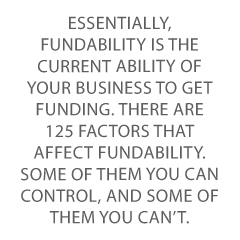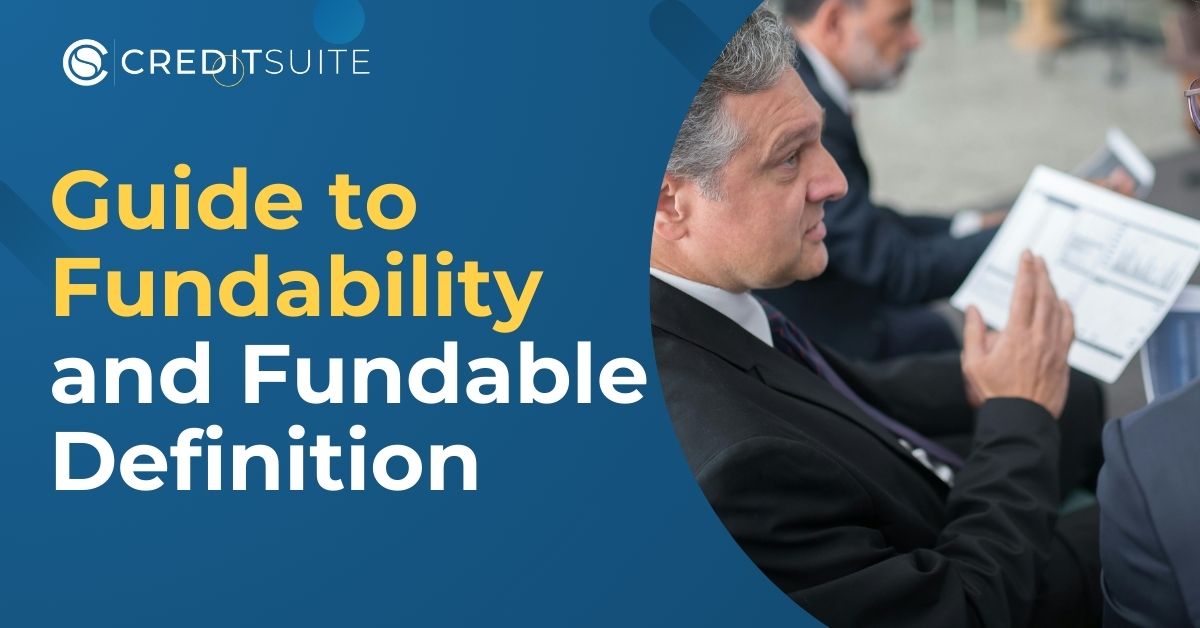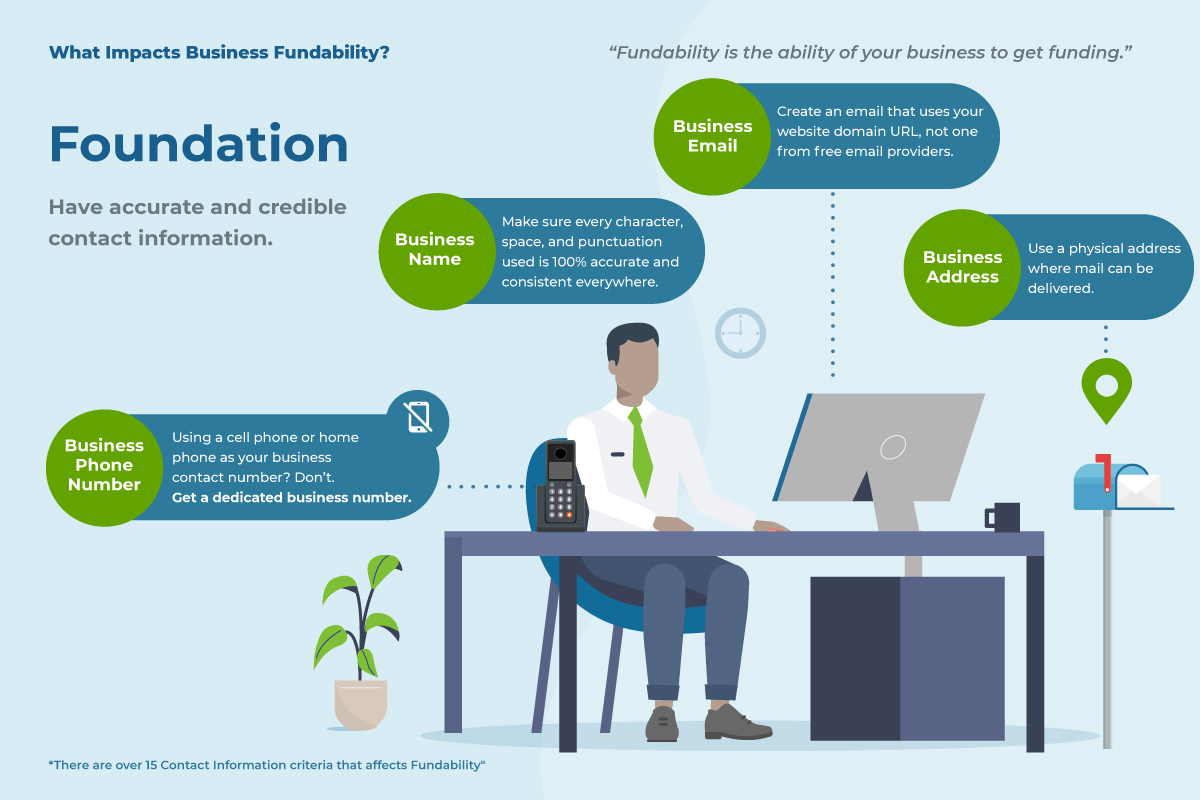The new year is a great time to review Fundability. To do that, it’s important to have a Fundable definition that you understand. Essentially, Fundability is the current ability of your business to get funding. There are 125 factors that affect Fundability. Some of them you can control, and some of them you can’t. Having a Fundable business means you can get the funding you need for your business, when you need it.
Fundable Definition: A Fundable™ Business Has a Foundation of Fundability
The way your business is set up lays down the foundation for Fundability. This includes a number of factors.
Business Name
First, keep the name of a high-risk industry out of your business name. Maybe try Bobby’s instead of Bobby’s Gas Station. This will help prevent early denial from a lender that only sees the “gas station” part.
Another common reason for credit denials is that the lender can’t easily locate a business. So, name your business in a way that makes it easy to find both online and offline. The name on your application should be exactly the same as what is online and on your Secretary of State paperwork.
It also needs to be the same everywhere else. This includes corporation papers, licenses, utility statements, and bank statements. In fact, all business information needs to be consistent. That means, if you change your business name, you have to be sure to change it everywhere.
Even the smallest details make a difference. If you use an ampersand in one place and the word “and” in another, you are going to run into issues. If you hyphenate your last name on one document, then you do not on another, a red flag will go up.
Business Address
Next, your business address needs to be a physical address where you can receive mail. Do not use a UPS box or a PO Box. A virtual address may work if you need to hold a meeting or an interview. In fact, it’s a lot more professional than meeting at your kitchen table. Still, not all credit providers will accept a virtual address.
EIN
Get a free EIN for your business at IRS.gov. This is an identifying number for your business similar to your personal SSN. Use your EIN to open a bank account and to build a business credit profile.
Business Entity
It’s important to incorporate. Incorporating creates a separate business entity, thereby adding a layer of protection between your business’s debts and actions and you. It doesn’t matter if you choose to do so as an S-corp, LLC, or C corporation when it comes to Fundability. Work with an attorney or tax professional to figure out which option will work best for your budget and need for liability protection.
Business Phone and 411 Listing
For Fundability purposes, you need a separate, dedicated business phone number. A separate number keeps your family from accidentally answering a business call, and it means your listing will have the name of your business and not your own. It should be listed with 411. Many credit providers actually require this.
Toll-free phone numbers are best. Lenders see them as a sign of business credibility. Thankfully, it’s very easy and inexpensive to set up a virtual local phone number or a toll free 800 number. Don’t use your personal cell or home number. Instead, have your business number forward to your personal number. It’s also easy, and perfectly fine, to use VoIP.
Business Licenses
Make sure you know what the licensing requirements are for your business at both the state and local levels.
Web Domain and Professional Website
Lenders and credit providers will research your corporation on the internet. Consequently, it is best if they learn everything directly from your business website. Not having a website can hurt your chances of getting business credit.
The website needs to be well put together and user friendly. If you can’t make it look professional, pay to have it professionally designed. It’s also important to pay for web hosting. Do not use a free service.
Along the same lines, you need a company email address for your business that has the same domain as your website. This is more professional than a free service URL such as Gmail or Yahoo. It also greatly helps your chances of getting approval from a credit provider.
Business Bank Account 
You must have a separate business bank account. The IRS frowns on mixing business funds and personal funds anyway. Separate accounts make it easier to keep funds separate. Beyond that, the date you open your business bank account is the day that lenders consider your first day of business.
As a result, if you opened a business bank account yesterday, your business started yesterday. That’s the case regardless of how long you have actually been in business. Time in business is a major factor for credit providers when it comes to approvals, so this is important.
A separate business bank account also means you can sign up for a merchant account, so you can take credit cards. Study upon study has shown that people will spend more if they are using credit rather than cash.
Get Set Up With the Business Credit Reporting Agencies
You’ll need a D-U-N-S number. You can get one for free on the Dun & Bradstreet website. You cannot have a business credit score with D&B without this number. Since they are the largest and most commonly used business credit reporting agency, a D-U-N-S number is essential.
Once you are in D&B’s system, search Experian and Equifax’s sites for your business as well. You’ll have an identification number from Experian as well. It’s called a BIN, but Experian assigns that number. You do not have to apply.
The Foundation is What You Can Control
You can control the way your business is set up. That’s good, because it is a huge piece of Fundability. In contrast, the rest of the factors that affect Fundability are not quite as controllable.
Still, you have to understand exactly what else affects the Fundability of your business if you hope to get a handle on it.
Fundable Definition of Other Business Data Agencies
There are other business data agencies that affect reports indirectly. This is in addition to the business credit reporting agencies that directly calculate and issue credit reports.
Two examples of this are LexisNexis and The Small Business Finance Exchange. These agencies gather data from a variety of sources, including public records. They even have access to information relating to automobile accidents and liens. You cannot access or change the data the agencies have on your business. However, you can ensure that any new information they receive is positive. Enough positive information can help counteract any negative information from the past.
Fundable Definition: Personal and Business Credit History
Your credit history has everything to do with your credit score, a huge factor in Fundability. Personal credit history consists of a number of things including:
- How many accounts are reporting payments?
- How long have you had each account?
- What type of accounts are they?
- How much credit are you using on each account versus how much is available?
- Are you making your payments on these accounts consistently on-time?
But with business credit, the main issue is whether you’re paying your bills on time.
The point is, the more accounts you have reporting on-time payments to the business credit reporting agencies, the stronger your business credit score will be.
Fundable Definition: Financial Statements
Both your personal and business tax returns need to be in order. It is best to have an accounting professional prepare regular financial statements for your business. Having an accountant’s name on financial statements lends credence to the legitimacy of your business.
Often tax returns for the previous three years will suffice for personal financials. Honestly, it’s best to have a tax professional prepare them. Now, this is the bare minimum you will need. Other information lenders may ask for include check stubs and bank statements, among other things.
Fundable Definition: Bureaus
There are other agencies with data relating to your personal finances as well. For example, FICO is where most traditional lenders will look for personal credit. Your personal FICO score needs to be as strong as possible.
ChexSystems is another example. They track bad check activity and their report makes a difference when it comes to your bank score. If you have too many bad checks, you will not be able to open a bank account. That will cause serious Fundability issues.
There are other bureaus with all sorts of information on you, like:
- Have you ever been convicted of a crime?
- Do you have a bankruptcy or short sale on your record?
- Do you have any liens or UCC filings?
All of this can and will play into the Fundability of your business.
Personal Credit Scores and Reports
Your personal credit scores from Experian, Equifax, and Transunion affect Fundability as well. If your scores aren’t great right now, work on them. The number one way to get a strong personal credit score or improve a weak one is to make payments consistently on time.
Monitor personal credit reports frequently to make sure the information is correct and current.
Application Process
Did you know that even the process of applying for a loan can affect Fundability? For example, consider the timing of the application. Maybe you paid off a large account recently. The payoff will increase your score. However, that may not be reflected on your credit reports immediately. It may be best to wait to apply until after the account shows as paid.
Also, your business name, business address, and ownership status need to be verifiable. Lastly, make sure you choose the right lending product for your business and your needs. For example, do you need a traditional loan or a line of credit? Would a working capital loan or expansion loan work best for your needs? Choosing the right product to apply for can make all the difference.
Get a Handle on a Fundable Definition
Obviously It can be difficult to get a handle on a Fundable definition. This is mostly because the entire idea of Fundability is so overwhelming.
Imagine, it is affected not only by the decisions you make today, but also decisions you made in the past. Not to mention, there are things that affect Fundability that you do not have any control over. Understanding exactly what Fundability is and what affects it is a great start to getting your business in a good position.



